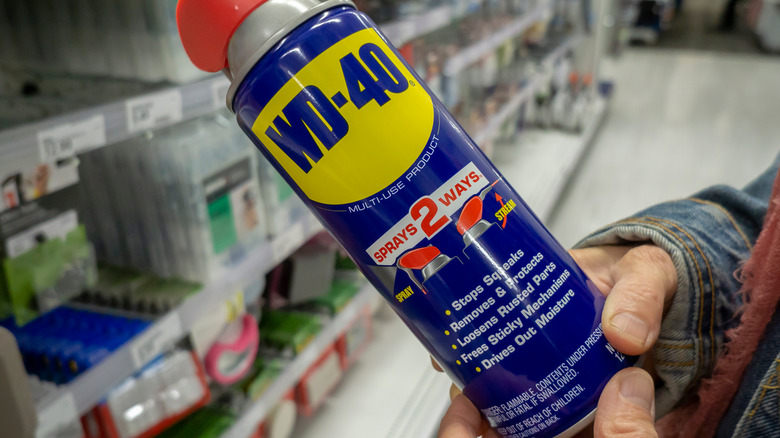The WD-40 Hack That'll Have Your Windows Shining In No Time
We have so many window surfaces to clean, but while some of them are weekly or biweekly projects — like tackling glass shower doors and bathroom mirrors — others are big semi-annual projects, such as cleaning your home's windows, inside and out. Fortunately, there are many ways to do these things, including using natural products like vinegar and water to clean any window surface and using shaving cream to prevent fogged glass in the bathroom. However, you can also use WD-40's multi-use product to clean windows because it leaves no streak behind while also eliminating adhesive marks from decals and stickers.
Let's face it, cleaning the windows is a big undertaking, and if you're on a high floor in an apartment building, you might only be able to tackle the inside panes. If you're in a house, you can clean all the lower floor windows yourself on both sides using this hack, saving money. As with the use of any chemical formulation, exercise caution. Although it is fairly low-odor, get your pets and children out of the room while cleaning with WD-40, make sure there's plenty of active ventilation, and when cleaning window panes, don't allow the product to seep onto the window sills, into the ground or drip onto any plants. Now that we have that squared away, here's how to use the garage staple to make your panes shine.
How to shine up those windows using WD-40
Here's what you'll need. Grag your WD-40 multi-use product, two microfiber cloths, a ladder if you need it to reach the top of your windows, and a tarp just below your work area. Whether cleaning the interior or exterior, set your tarp down to catch spills. Spray the WD-40 onto your windows and clean them with your microfiber. Have the dry cloth handy to immediately remove any residue and buff those windows to a shine. Don't skip this second step, as you can potentially leave behind streaks.
Most people know WD-40 as a lubricant that gets rusty parts moving again. So why are we using it to clean windows? What makes it work is that, among other ingredients, it contains surfactants, a primary component used in making soaps and detergents. It is in part a cleaner. If you've had a can sitting unused in the garage for ages, you may be wondering if it ever expires and whether you can still use it. If it hasn't evaporated and is still in the can, it's good to go. It is not recommended for use on tinted or coated windows or car windshields because the product's chemicals can impact the finish and visibility, respectively.

